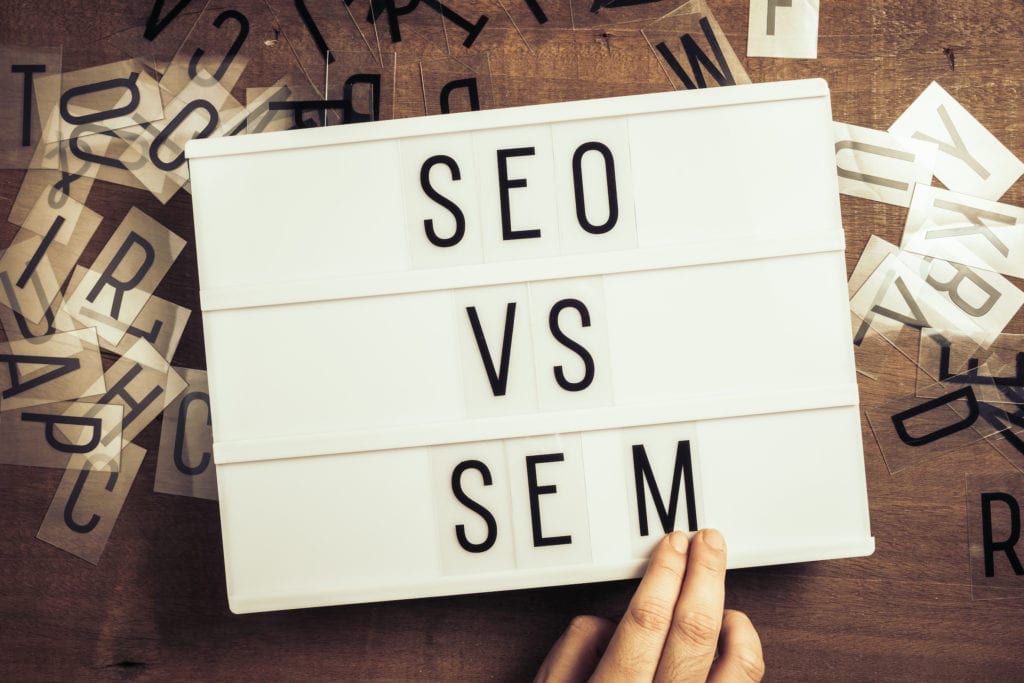When it comes to increasing web traffic, generally, your options come down to search engine optimisation (SEO) and search engine marketing (SEM). You can’t learn digital marketing overnight, so to make it easier to settle on a strategy, we compare the benefits of SEO and SEM.
What is SEO?
A strong SEO strategy is becoming an increasingly crucial tool for small businesses in NZ, but what does this entail?
SEO is about creating organic web traffic. You’re not paying to reach the top of search engines but creating an optimised website with reliable content to build authority.
Search traffic is more likely to trust organic results over paid ads, as it emphasises trust and authenticity. A few key elements work together to create a successful SEO strategy.
On-Page Optimisation
The part of on-page optimisation that people are familiar with is keywords. However, it’s not just picking phrases to throw out at any opportunity. Various tools allow you to gain insight into what people are searching for, what the traffic is like, and take advantage of relevant keywords. These keywords should be worked naturally into your content and spread evenly throughout the page.
Search engines do pick up on keyword stuffing, so use them wisely. You’re not looking to have it pop up in every sentence, but a good rule of thumb is to include one around every hundred words.
Off-Page Optimisation
Create a reputation with other sites. High-quality backlinks are the treasure trove of SEO. When high-authority websites link back to your site, it contributes to your reputation and the trust that search engines have in your content.
Guest posts and outreach articles are one way to create valuable backlinks for your site. The links must come from reliable places. If your backlinks feel spammy and unreliable, they won’t do anything good for your authority score.
Technical Optimisation
Technical optimisation is where your web developer comes into the picture. It’s vital to ensure that search engine crawlers can find, crawl and index content. If you have pages blocked from crawlers in your Robots.txt, they’re not likely to rank.
The same applies to page speed. Search engines will only crawl each page for a limited period. The page must load quickly, with a logical flow of optimised content sitting above the fold. Well-structured content will help crawlers index your content, enabling you to rank in search results.
Benefits of SEO
When successful, your SEO strategy will see your business rise to the top of search results. Above them will be paid ads, but that’s no reason to worry. Most search traffic ignores paid ads completely, scrolling down to the organic results. Although it takes time to see your hard work reflected in your rankings, it’s a worthwhile investment.
Users are more likely to trust organic results as they have gained genuine authority rather than paying for a top spot. SEO is a strategy for the long-term, and with commitment, you will see a dramatic increase in organic traffic.

What is SEM?
Although many users will ignore paid ads, don’t dismiss search engine marketing just yet. SEM uses platforms like Google Ads to appear in paid search results.
Pay-Per-Click
Set your budget and keywords, and bid for the top spot in relevant searches. The amount you bid will determine where you rank among paid results; the higher the budget, the higher the ranking. PPC allows you to set a target audience to ensure your investment pays off by showing your ads to the right people.
Quality Score
Once you’ve created your ad copy, Google’s quality score will show you how it compares to your competition. Shoot for a high score, as it will discount clicks and have your ads seen by more people.
Your quality score comes down to three factors: expected clickthrough rate, ad relevance, and landing page experience. The score will indicate areas where your ad needs improving, whether that’s choosing new keywords, optimising landing pages, or rewriting copy.
Benefits of SEM
If you’re looking for instant results, SEM is a winner. Take time to create quality ads that, although less likely to drive conversion, will increase brand awareness. Unlike SEO, you’re not investing in long-term work and can opt out of bidding at any time if you’re not receiving your desired results.
SEM ads are easy to manage once you’re familiar with the tools. The entire Google Ads platform makes it easy for businesses to obtain paid search engine results. SEM and PPC are more affordable options for short-term success, but once you stop bidding, it’s instantly reflected in your traffic.
Can They Work Together?
SEO and SEM can work quite well together. One can push your site to the top of paid results, get in front of your selected audience, and increase visibility – quickly. While this is happening, you can work on your SEO strategy, slowly increasing trust and working your way to the top of those organic results.
Whether you choose one, or both, SEO and SEM can help your site receive clicks and drive traffic through the roof. All it takes is ensuring that your chosen strategy aligns with your goal.
Ready to take take your business to the next level?
Upskill in Digital Marketing with NZIE. Check out our range of courses: from short courses in social media marketing strategy and SEO to a full Digital Marketing Diploma.

